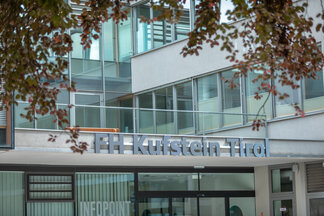Our full-time bachelor's degree program offers the ideal preparation for an international career, with the opportunity to spend up to three semesters abroad. Start your journey to global success today!

International Business Studies
Bachelor's degree program
Overview
-
Qualification Level:
Stufe 1, Bachelor -
Price:
Euro 363,36* (excl. Student Union-fees) each semester -
Academic Degree:
Bachelor of Arts in Business (BA) -
Academic Program:
Full-time -
Language:
55% German, 45% English -
Remote Options:
E-Learning max. 30 % online -
Exchange Semester:
Study abroad in the 3rd and 4th semester, professional internship in the 6th semester (optional abroad)** -
Admission Requirements:
General admissions regulations -
Study Places per Year:
45
Program Description



Digital and international – this is the face of tomorrow's working world. As industries undergo reinvention, companies are in urgent need of managers ready to strategically drive these major transformations. The challenges are plenty, from digitization and sustainability to artificial intelligence!
Our bachelor's degree program in International Business & Management offers the perfect preparation for the global challenges of today’s economy. With up to three semesters abroad, it provides not only personal enrichment but also fosters intercultural competence and personal growth. We emphasize key skills such as analytical thinking, strategic planning, effective communication, as well as flexibility, creativity, and global thinking. The program’s strong international focus, combined with study abroad opportunities, equips graduates for successful careers in the global economy, shaping them into future leaders with a deep emphasis on personal development and intercultural experience.
Study Focus
-
32 %
Expertise in business & management
-
08 %
Expert knowledge in digitization & sustainability
-
18 %
International Skills (2 semesters abroad)
-
15 %
Social Skills & Languages
-
27 %
Practical knowledge transfer and Bachlor's thesis
What You Will Learn
-
Strategic understanding: grasping economic interrelationships
-
Practical experience: gaining professional expertise through projects
-
Methodological expertise: structured solutions using quantitative methods
-
Language Competence: Intercultural Communication for International Contexts
-
Communication skills: perfecting communication and teamwork
-
Digitization & Sustainability: Basic knowledge for future challenges
-
Practical knowledge transfer: effective application of concepts in the professional field
Popular Occupational Fields
- Marketing, product management, sales
- Finance & accounting
- Personnel & organizational development
- Project management & business development
- Consulting
- Corporate management / start-up
- Can be used in all industries, company sizes and types
Career Opportunities
-
16% of domestic SMEs
active in cross-border online sales
-
> 160 Hidden Champions
in Austria
-
53% of exports
of Austrian GDP
-
20,000 new jobs per year
in Austria through digitization,
The path to the Bachelor's Degree

The didactic concept is designed to systematically develop the key competencies required in today's complex and uncertain (VUCA) work environment. Flexibility and self-organization are continuously cultivated through tasks that become progressively more open-ended and less defined, encouraging students to adapt to evolving challenges.
Special features:
-
1st year of study (VUCA-Basic): Clear guidelines and support in the first two semesters
-
2nd year of study (VUCA-intermediate): Promotion of self-organization through study abroad in the 3rd and 4th semester
-
3rd year of study (VUCA-pro): Maximum openness and flexibility in the 5th and 6th semester, including internship and Bachlor thesis
Recognition of Prior Learning
Students with sufficient qualifications from Austrian commercial academies and higher occpuational profile schools with an economic focus (Germany and Austria) can receive credit for the following courses from the first semester:
- Introduction to Business Administration
- Introduction to Accounting and Finance
To apply for credit, they must submit a request directly to the Director of Studies.
Director of Studies

Prof. (FH) Dr. Peter Dietrich
Director of Studies Bachelor / Master International Business Studies
Curriculum
Digitalization & Sustainability Competences
Digital Transformation & Artificial Intelligence I: Basics & Tools
- Semester 1
- 3 ECTS
• Introduction and history of the development of digitization • Basic concepts and basic theories of digitization • Overview of the factors influencing Markets & Companies through digitization • Overview of the connections between digitization and classical business-related management functions (marketing, sales, HR, R and D, etc.)
DetailsDigital Transformation & Artificial Intelligence II: Markets & Companies
- Semester 2
- 3 ECTS
• Development and change of markets, industries and business models through digit-ization • Influence of digital trends on customers, competitors and market performance • Effects of digitization on classical business-related concepts of: Companies, organi-zation, management, culture, etc. • Reflection and adaptation of classical business theories and models to digitization (life cycle, value chain, 5-forces, etc.)
DetailsSustainability in Business & Society
- Semester 4
- 4 ECTS
• Ethics and morals in theory and practice • Discussion of orthodox management approaches (including principal-agent theory, shareholder value approach) from an ethical perspective • Soft- vs. hard-law and its influence on the sustainability of management decisions • Sustainable Development Goals (SDGs)
DetailsInternational Business & Management Competences
Business Mathematics
- Semester 1
- 4 ECTS
• Linear and quadratic functions • Elementary financial mathematics • Differential calculus • Systems of linear equations • Analysis of functions with two variables
DetailsFinance & Investment (E)
- Semester 1
- 2 ECTS
• Valuation methods for bonds and shares as well as financing and investment deci-sions of companies (including discounting methods, e.g. net present value, internal rate of return) • Interest rates and the significance of interest rate developments on international financial markets • Valuation of bonds and shares
DetailsBUSINESS STUDIES I: Introduction
- Semester 1
- 3 ECTS
• Fundamentals and classification of ABWL • Fundamentals of corporate management: Location decisions, inter-company con-nections, corporate constitution, organization, personnel management • Basics of monitoring and cross-connections to Accounting & Finance • Selected topics on service provision: Innovation management, carefully-selected marketing content
DetailsAccounting & Finance I: Introduction
- Semester 1
- 3 ECTS
• Posting records, accounts, account assignment • Structure of balance sheet and profit and loss account • Posting of business cases • Cost type, cost center and cost unit accounting • Contribution margin and application • Modern cost accounting systems
DetailsAccounting & Finance II: Accounting
- Semester 2
- 3 ECTS
• Structure of the balance sheet, income statement and cash flow statement • Valuation principles for assets • Risks in debt capital • Balance sheet ratios
DetailsBUSINESS ADMINISTRATION II: Supply Chain Management
- Semester 2
- 3 ECTS
• Production theory, planning and organization of production • Logistics in the company (procurement, storage, transport) • Supply chain management internally and externally
DetailsManagerial Economics & Individual Decision-making
- Semester 2
- 3 ECTS
• Economic growth, social inequality and ecological conditions • Efficient allocation of scarce resources • Market model and market equilibrium • Strategic interaction and social dilemmas • Elasticity, pricing and market types • Welfare analysis of state interventions
DetailsBusiness studies specialization and region-specific events (1/2)
- Semester 3
- 26 ECTS
A precise description of the specific teaching and learning content for the two semes-ters abroad cannot and should not be defined due to the large number of partner universities and the choices offered there within the field of economics, in order to guarantee students freedom of choice. The partner universities can be divided into three groups (industrial countries outside Europe, European countries and developing and emerging countries). In the following, an exemplary combination of courses including national credits is provided for a partner university (for further and updated information, please refer to the respective partner university's website) Example: University of the Free State, Bloemfontein, South Africa • Strategic Management, OBS314, Credits 16 • Labour Economics and International Economics, EKN314, Credits 16 • Training and Development, TRG314, Credits 16 • Development, Underdevelopment and Poverty, SOS312, Credits 8 • Advanced Marketing Management, OBS324, Credits 16 • Financial Management, OBS364, Credits 16 • Development Economics and Public Finance, EKN324, Credits 16 • Governance and Political Transformation in Africa, PTW242, Credits 8
DetailsMarketing & Customer Experience (E)
- Semester 1
- 4 ECTS
• Importance and basics of marketing • Marketing mix factors and their orientation towards the customer • Product vs. service marketing • Importance of brands in marketing
DetailsBusiness studies specialization and region-specific events (2/2)
- Semester 4
- 26 ECTS
A precise description of the specific teaching and learning content for the two semesters abroad cannot and should not be defined due to the large number of partner universities and the choices offered there within the field of economics, in order to guarantee students freedom of choice. The partner universities can be divided into three groups (industrial countries outside Europe, European countries and developing and emerging countries). In the following, an exemplary combination of courses including national credits is provided for a partner university (for further and updated information, please refer to the respective partner university's website) Example: University of the Free State, Bloemfontein, South Africa • Strategic Management, OBS314, Credits 16 • Labour Economics and International Economics, EKN314, Credits 16 • Training and Development, TRG314, Credits 16 • Development, Underdevelopment and Poverty, SOS312, Credits 8 • Advanced Marketing Management, OBS324, Credits 16 • Financial Management, OBS364, Credits 16 • Development Economics and Public Finance, EKN324, Credits 16 • Governance and Political Transformation in Africa, PTW242, Credits 8
DetailsIntroduction to Law
- Semester 5
- 2 ECTS
• Legal bases (step-by-step structure of the legal system) • Private law • Commercial law • Sub-areas of commercial law (unfair competition, internet law, insolvency law, etc.)
DetailsMarket Research & Customer Insights
- Semester 5
- 4 ECTS
• Importance of market research and its integration into the marketing process • Planning and implementation of market research projects • Creating and programming questionnaires • Selected qualitative and quantitative analysis methods • Application of statistical software (SPSS, R, Stata) for data analysis • Options and sources of secondary market research (e.g. Big Data)
DetailsOrganizational Psychology & Change Management
- Semester 5
- 3 ECTS
• Organization theories • Leadership, teamwork, conflicts • Organizational climate and culture • Change management models • Methods and tools of change management • Communication in the change management process
DetailsPolitical Economics & Collective Decision-making
- Semester 5
- 3 ECTS
• Interpretation of gross domestic product and consumer price index • Measurement of economic growth and inflation • Tasks of central banks in relation to money supply and interest rate setting • Aggregated demand and aggregated supply • Systemic crises related to the financial sector and environmental pollution
DetailsInternational & Environmental Economics
- Semester 5
- 4 ECTS
• Classical and modern trade theories • Agglomeration advantages and choice of location • Welfare effects of tariffs and trade quotas • Balance of payments, current account and capital account • Measurement and determinants of exchange rates • World Trade Organization and Monetary Union • Globalization and worldwide supply chains
DetailsMethodological & Scientific Competences
Academic Methods
- Semester 2
- 1 ECTS
• Characteristics, rules and basic principles of science and scientific work • Scientific theory and methodological principles of scientific research • Overview of the research method observation, questioning, content analysis and experiment • Using word processing programs to write formally correct scientific papers • Overview of databases and other ways to find literature sources
DetailsScientific Topics in International Business Studies
- Semester 5
- 4 ECTS
• Current trends in practice and research in International Business Studies • Development and careers of topics and methods • Research in databases
DetailsBusiness Statistics (E)
- Semester 5
- 3 ECTS
• Basic concepts of statistics • Univariate and multivariate data description • Basics of probability theory and theoretical distributions • Estimation procedures and statistical tests • Software like MS Excel (in-depth) and/or SPSS/R (on an illustrative basis)
DetailsBachelor Thesis Seminar
- Semester 6
- 10 ECTS
• Advancing the knowledge of scientific work with regard to the development and implementation of a research design as well as the structuring of the editing pro-cess. • Regular meetings to discuss the current status and progress of the Bachelor thesis with the accompanying academic supervision • Information on the final Bachelor examination
DetailsBA-Camp
- Semester 6
- 1 ECTS
• Topic development and preparation in the context of a poster and an exposé • Presentation and discussion of a poster in small groups • Poster and exposé creation
DetailsImplementation Competences
Agile project management & practical project I
- Semester 2
- 5 ECTS
• Project planning and organization • Project cooperation and implementation • Project performance • Key figures of project management • Implementation of practical project, "Business idea development”
DetailsBusiness Simulation Game (E)
- Semester 1
- 2 ECTS
• Operational functions (production, marketing, logistics, supply chain management) • Market analyses and market developments • Use of analysis tools (SWOT, benchmark, market shares, cost and contribution margin analyses, etc.) • Development of strategies • Controlling and key figures
DetailsDigital Transformation & Artificial Intelligence III: Communication & Practical Project
- Semester 5
- 5 ECTS
• Impact of digitization on communication and information using proven concepts (stakeholders, etc.) • Importance and change of project management in the digital age • Elaboration of a practical project focusing on digitization using a specific company • Toolbox for the implementation of digital topics
DetailsInternship
- Semester 6
- 19 ECTS
The course content depends on the activities the students do at the internship pro-vider. The students choose an internship independently. They can draw on the ex-tensive range of internships offered by the Kufstein Tirol University of Applied Scienc-es. The Director of Studies checks the professional correspondence of the internship activities with the contents of the course and the qualification profiles of the course of studies. Subsequently, the Director of Studies checks whether the internship corre-sponds to the training objectives of the program and whether the student can be employed according to his/her level of qualification. A detailed internship guide sup-ports the students in organizing their internship semester. Mind. 475 working hours in full employment must be completed.
Detailssocial skills
Teambuilding & Teamwork
- Semester 1
- 1 ECTS
• Basic information on communicative processes and effects • Fundamentals of cooperation, negotiation, conflict resolution as well as group dy-namics and team leadership • Self-efficacy, self-control, resilience, self-management, work-life balance
DetailsCommunication & presentation technology
- Semester 1
- 2 ECTS
• 5 axioms of communication, message and value square • Theoretical introduction to presentation and argumentation techniques (analog and remote) • Application of the discussed contents • Feedback and reflection of one's own presentation achievements (individually and in the group) and the achievements of fellow students
DetailsLanguage, Communication and Cultural Skills
1. Foreign Language I
- Semester 1
- 6 ECTS
The language modules integrated into the degree program curriculum are designed according to the methodological principles of a communicative, action-oriented approach. The competence levels of the modules are based on the Common European Framework of Reference for Languages (CEFR), and a central objective is that students increase their communication skills by at least one level. In addition, there is a clear focus on acquiring academic and business-oriented skills in the target language. - A1-A2 Basic communication skills - B1-B2 Advanced use of the language and communication skills - B2-C1 Independent language use to expert communication skills - C1-C2 Expert language skills to fluent, competent communication skills
Details2. Foreign Language I
- Semester 1
- 6 ECTS
The language modules integrated into the degree program curriculum are designed according to the methodological principles of a communicative, action-oriented approach. The competence levels of the modules are based on the Common European Framework of Reference for Languages (CEFR), and a central objective is that students increase their communication skills by at least one level. In addition, there is a clear focus on acquiring academic and business-oriented skills in the target language. --A1-A2 Basic communication skills --B1-B2 Advanced use of the language and communication skills
Details1. Foreign Language II
- Semester 2
- 6 ECTS
The language modules integrated into the degree program curriculum are designed according to the methodological principles of a communicative, action-oriented approach. The competence levels of the modules are based on the Common European Framework of Reference for Languages (CEFR), and a central objective is that students increase their communication skills by at least one level. In addition, there is a clear focus on acquiring academic and business-oriented skills in the target language. - A1-A2 Basic communication skills - B1-B2 Advanced use of the language and communication skills - B2-C1 Independent language use to expert communication skills - C1-C2 Expert language skills to fluent, competent communication skills
Details2. Foreign Language II
- Semester 2
- 6 ECTS
The language modules integrated into the degree program curriculum are designed according to the methodological principles of a communicative, action-oriented approach. The competence levels of the modules are based on the Common European Framework of Reference for Languages (CEFR), and a central objective is that students increase their communication skills by at least one level. In addition, there is a clear focus on acquiring academic and business-oriented skills in the target language. - A1-A2 Basic communication skills - B1-B2 Advanced use of the language and communication skills
DetailsStudy regulations to download
-
International Business Studies
in effect since October 11, 2023, start of study program from academic year 2024/25
- All study regulations
Frequently Asked Questions
Can I work while studying?
Classroom teaching usually occurs from Monday to Friday, occasionally on Saturdays in blocked units. With a significant amount of self-study, students can manage their schedules independently and have the flexibility to work part-time in the industry.
Where can I spend the semester abroad?
We have over 225 partner universities worldwide from which our students can choose. Some partner universities are particularly suitable for students from this degree program, as they offer further content and thus allow students to deepen their skills even further.









